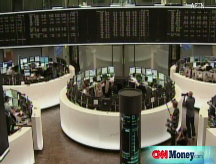Oil falls to 17-month low
Crude ends negative on renewed recession fears.
NEW YORK (CNNMoney.com) -- The price of oil settled at its lowest level since May 29, 2007 Monday as investors worried that the global economy may not be able to sustain demand for fuel as world markets tumbled.
U.S. crude for December delivery ended the day down 93 cents to to $63.22 a barrel in New York.
The price of oil on Monday was closely following the performance of stocks.
"I think you could overlay an S&P (500 index) map with a crude (oil) map, and you'd have trouble telling which is which," said James Cordier, founder of commodities brokerage Optionsellers.com.
World markets: Investors sold off crude futures as stock indexes around the world fell.
Japan's Nikkei index closed down 6.4% Monday, its lowest close in 26 years. Markets in Hong Kong and Europe also plummeted.
In the U.S., the Dow Jones industrial average fell 3.6% Friday, and had fallen an additional 0.2% as oil floor trading ended.
Earlier during the session, U.S. stocks had rallied 200 points after an unexpected boost in September housing sales, news that regional banks would be receiving $18 billion in federal funds, and a big third quarter for Dow component Verizon (VZ, Fortune 500), the nation's second-largest telecom company.
Oil prices rose as high as $65.60 during Monday trading - in tandem with a morning Dow rally - but mounting concern about a global recession and its impact on crude consumption sent prices falling again.
Falling demand: Last Friday, concern about demand drove down oil prices despite a pledge by the Organization of Petroleum Exporting Countries to cut production by 1.5 million barrels a day.
Falling demand for petroleum-based fuels in the current economic climate has driven oil prices down more than 57% since hitting a record high of $147.27 in July.
The retail price of gasoline in the U.S. has also fallen. Retail gas prices averaged $2.668 a gallon overnight Monday, according to a daily survey from motorist group AAA. Prices peaked at $4.114 a gallon in July.
According to the Department of Transportation, Americans have been seriously cutting back on their driving habits.
American drivers reduced the number of miles they drove by 5.6%, or 15 billion miles, during the month of August compared to the same month last year, according to a report released Friday. That was the largest monthly drop in miles traveled since the department began reporting data in 1942.
But even if stocks recover, oil prices may not rise significantly any time soon, since consumers and businesses have already started cutting back on oil use, said Cordier.
"A certain amount of demand destruction has already taken place, and it's going to take a while to get it back," he said. "You've got to blow the mothballs off the jet that's over there in the desert."
OPEC production: The fall in fuel demand, coupled with the decline in market confidence outweighed a decision by OPEC, an association of oil producing nations that account for about 40% of the world's oil supply, to cut production levels by 1.5 million barrels a day.
The trade cartel has expressed concern that the record high crude prices in July, and the subsequent economic downturn, may have permanently impaired demand for oil.
"I think they needed to do something, and take some course of action," said Tom Orr, head of research for trading firm Weeden & Co in Connecticut. If prices fall near $50 a barrel, "I think they will cut more ... they have to," he added.
Several OPEC members, including Iran and Venezuela, rely heavily on oil revenue to support their local economies. ![]()




